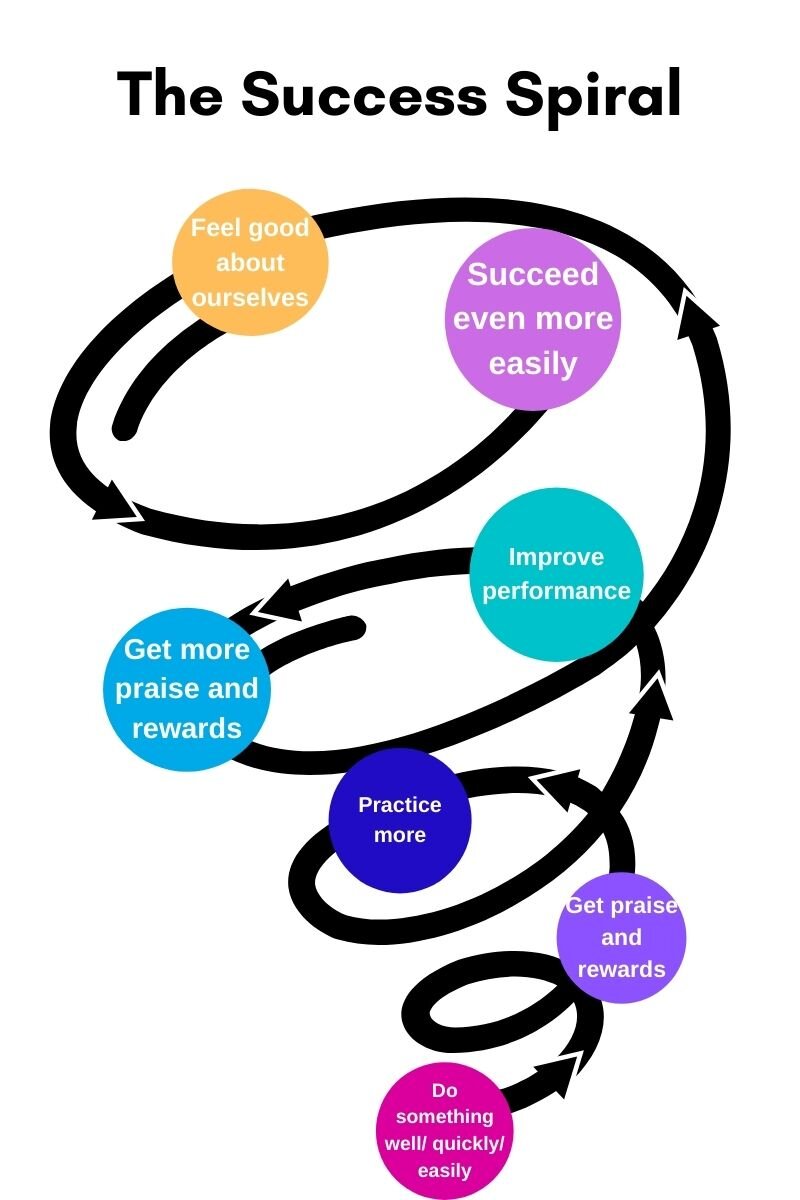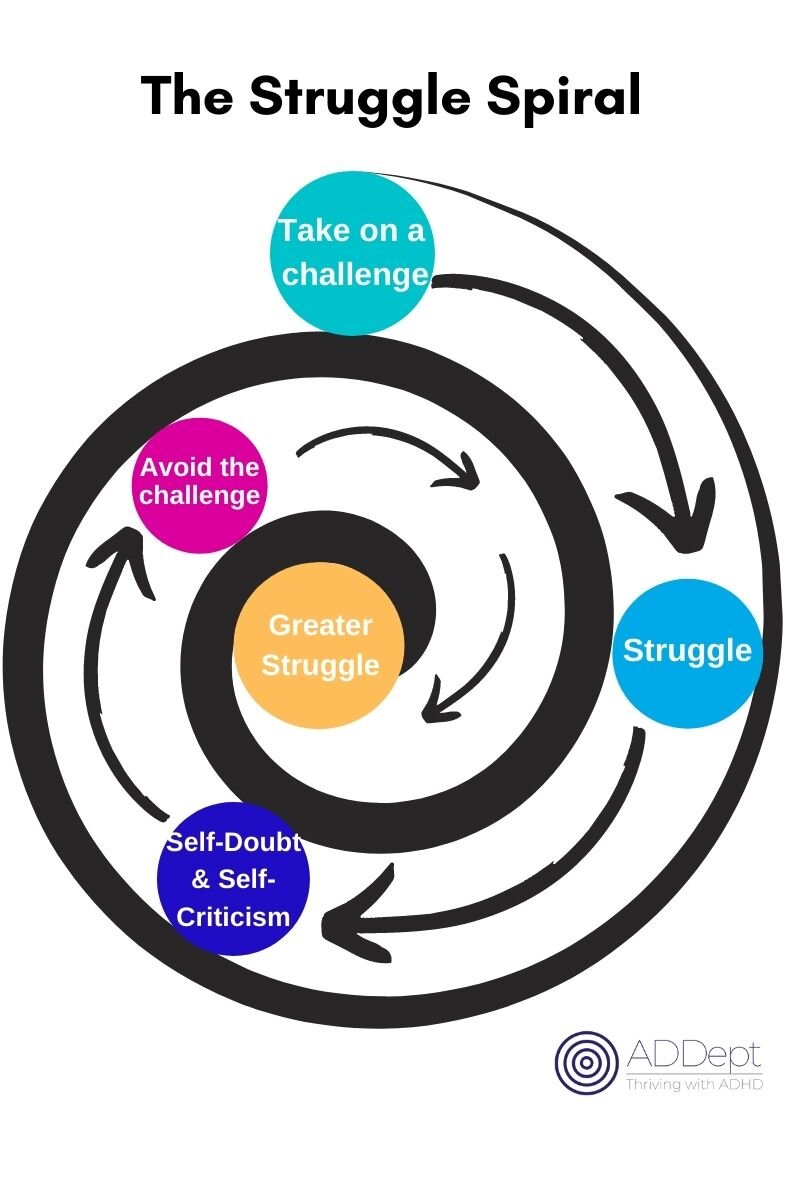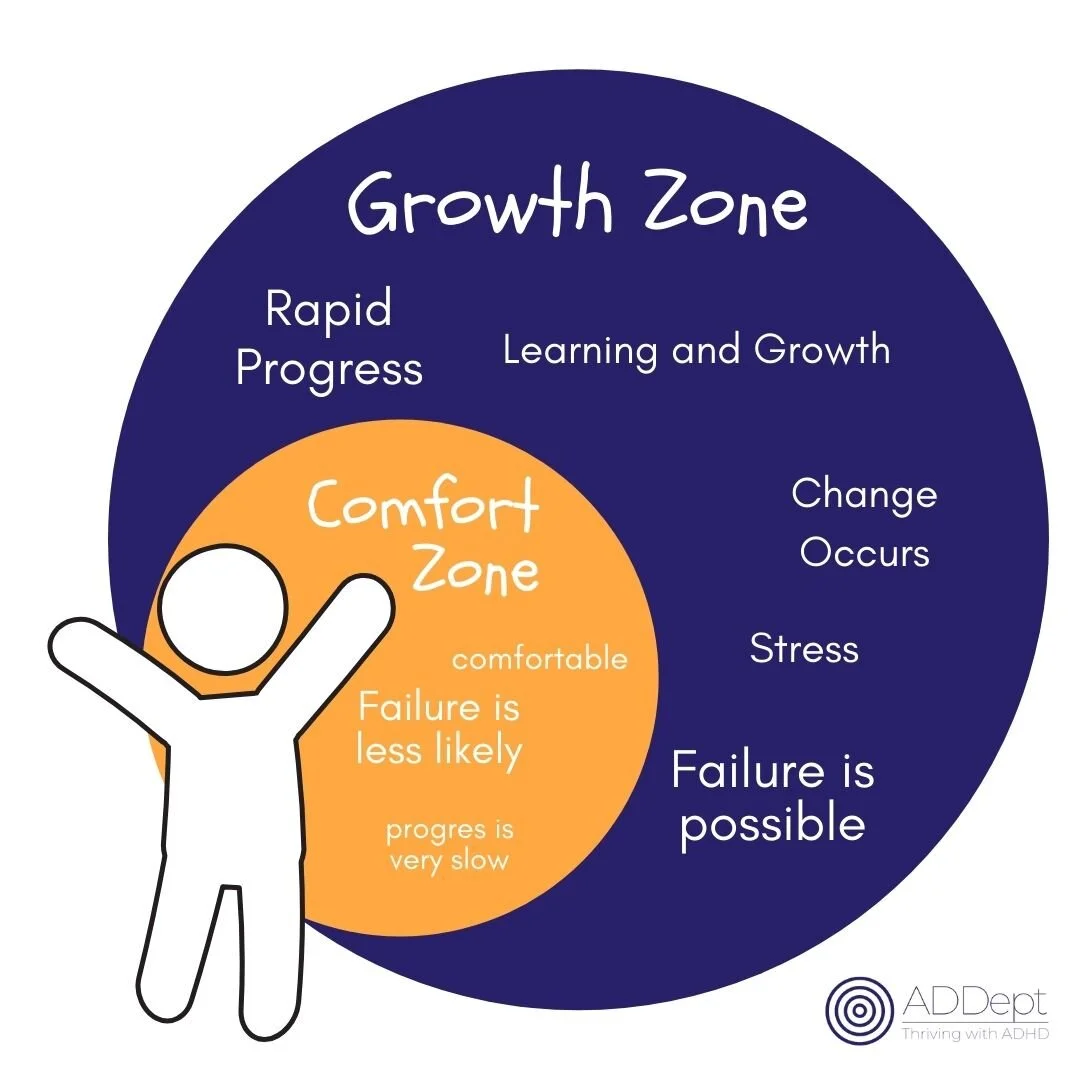How to Overcome Failure:
Growth Mindset and the ADHD Brain
My 7-year-old hates math. I’m acutely aware of this because we are the kind of mean, horrible parents who force our kids to do (just a little) schoolwork all summer. So, all summer long, I’ve heard his groans, watched his avoidance, and worked with his pleading to not do it.
But, you know what my math-hating little guy loves and would happily do any day, of the week? Read. He loves, loves, loves to read. He loves picture books, chapter books, science books, comics, encyclopedias, and pretty much anything that will tell him a story.
Now- take a wild guess- what do you think comes easily to him? Math or reading?
Of course! Reading was quick and pretty easy for him. We all like the things that come easily. It feeds our self-esteem and creates something I call the success spiral.
The Success Spiral
When we do something, and we do it well, it feels good. So we do more of it. And then what happens? We get even better at it, making us feel even better. We get more praise, more self-esteem, and we start to focus on it. Sometimes this good feeling can even roll over into trying other activities and if the success continues, we feel good.
Really good. The more we succeed the better we feel and the harder we work and the upward spiral continues.
The problem with the success spiral is that the good feelings only last as long as the success does. Which makes it feel precarious and often not always true. If we need to win, do things quickly and easily, and get rewarded to feel happy; then we’re always only one bad grade, one harsh critique, or one missed deadline away from demoralization.
The Struggle Spiral
Hard things tend to have the opposite effect. We do something hard, we struggle, and then we make this mean something wrong about ourselves: we're stupid, we're lazy, we'll never be able to do anything right. And of course, few things feel more horrible than this, so we avoid what made us feel this way.
And what happens when we avoid doing the thing we are struggling with?
We don't improve, and the next time we struggle just as much (if not more, because now we have all these bad feelings about it as well).
The Fixed Mindset
At the heart of these two spirals is something Stanford psychologist, Carol Dweck, has named the Fixed Mindset. A fixed mindset is a belief that ability, intelligence, and aptitude are all fixed. You’re born with a certain amount of, and that's all you get. With this mindset, success is a signal of ability- it's a signal that you're smart or talented or capable. Failure, on the other hand, is a sign that you aren't smart or can't succeed. Failure, or even just struggle, signals your inherent weakness.
Fixed mindsets abound among today’s adults. For most of us, growing up, we were taught precisely this paradigm. In fact, until just a few years ago, even psychologists believed that things like intelligence were relatively fixed. The more research that’s been done, the more we’ve learned just how wrong we were. In fact, our brains actually grow and change throughout our lives. We can become more able, we can become smarter, we can get more talented. With continued practice, we learn, and our brains and knowledge base grows.
But you can’t learn without failure. Because failure is, at its base, a signal that you're pushing yourself past your comfort (or proficiency) zone. And it's not until we push ourselves past that zone that we start to grow.
Take, for example, a friend of mine who never really exercises much. She decided to get into shape this past summer. She downloaded a couch-to-5k program and followed it to the T. In the beginning, she couldn't run for longer than 2 minutes at a time. So she started the program with a 2-minute jog, 1-minute walk intervals. A few days later, she moved on to 2.5 minutes running and 1 minute off; then 3 minutes on, 1 minute off. Each time that run interval was pushed up, it hurt.
She talked about how her lungs would burn, and her legs would scream at her to stop. Now, had my friend taken that pain as a signal to stop, a sign that she's not cut out for this, she would never have crossed that 5K threshold. But instead, she felt that burn as a sign that she was growing (literally building her respiratory and circulatory systems). And just last week, she jubilantly crossed the finish line of her first-ever race. This is the growth mindset.
The Growth Mindset
With a growth mindset, the goal is growth and learning. The belief is that everyone can grow, learn, and get better. That no one is born a star, people may have some natural aptitude, but with practice, we can all develop our abilities. The growth mindset believes that struggle, pain, and failure are all signs that this learning is happening and, therefore, positive signals of effort. When you have a growth mindset, you approach hard work, struggle and effort with an open, accepting, and even welcoming mind. You keep returning to the challenging task because it's the effort you honor, and the struggle that you know is making you stronger. And because you keep returning to it, you get better and better.
This is what I keep trying to help my 7-year-old to understand. It's also why I kept him at his math problems all summer. Not because I need him to be an astrophysicist, not because I worry about his ability to keep up with his peers, but because I want him to keep trying. To keep at the struggle and learn to appreciate it for what it's doing for him and his brain. I celebrate his effort and relish the new things he can do because of the effort. I also try really hard (because it's not easy) to not emphasize his success, because it’s struggling and doing it anyways that I want him to appreciate in himself.
Mindsets and ADHD brains
It's easy to stay stuck in a fixed mindset with an ADHD brain. To see your brain's struggles with things like time management, initiation, planning, or organization and compare it to the seeming ease of people around you. If you listen closely, you may hear yourself say things like:
I can't do [fill in the blank].
I don't like [blank].
What the hell is wrong with me?- I'm so stupid/lazy/[fill-in-the-blank].
I give up, I’m no good at this
This is too hard
I'll never be that smart/ capable/ successful
Fixed mindsets will keep anyone stuck. But they’re particularly toxic to ADHD brains. They can trigger RS (rejection sensitivity) reactions, they often underlie procrastination and avoidance. And fixed mindsets make us deeply wary of trying anything new. This can keep you, not just from being productive, but working on new (or old) strategies and solutions that could make your ADHD symptoms easier. Fixed mindsets are also inherently limiting. Because, if you only feel you can do the things that you know you will succeed at then you can never grow, develop or conquer new frontiers.
Growth mindsets, however, embrace the challenge. They see the struggle and celebrate effort. They look at the extra effort your ADHD brain puts into daily life and honors the hard work. They see possibilities and work to find strategies that will get them there. Essentially, with a growth mindset, any dream you can dream can be accomplished. Not easily, not without struggle, not even without failure. But with enough time, effort, and smart strategies you can push yourself wherever you want to be.
What mountains can you and your ADHD brain scale if you embraced a growth mindset?
Ready to shift from
meltdown to mastery?
This online course has been designed specifically to help teach the strategies ADHD brains need to help them move from overwhelm and meltdowns to confident emotional mastery.
Want to know more about
thriving with ADHD?
Check out these other articles:














Why We Can’t “Just Tune It Out”
Hypersensitivity, Sensory Sensitivity and the ADHD Experience